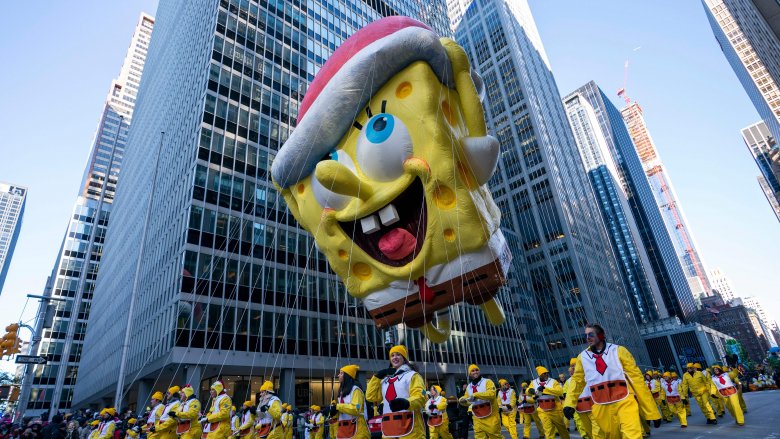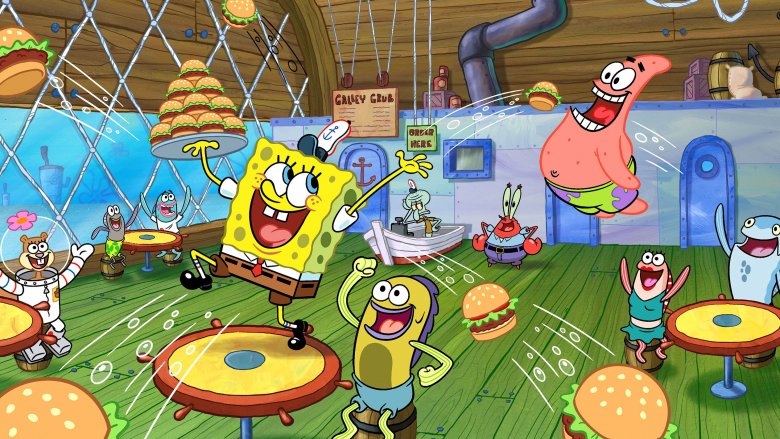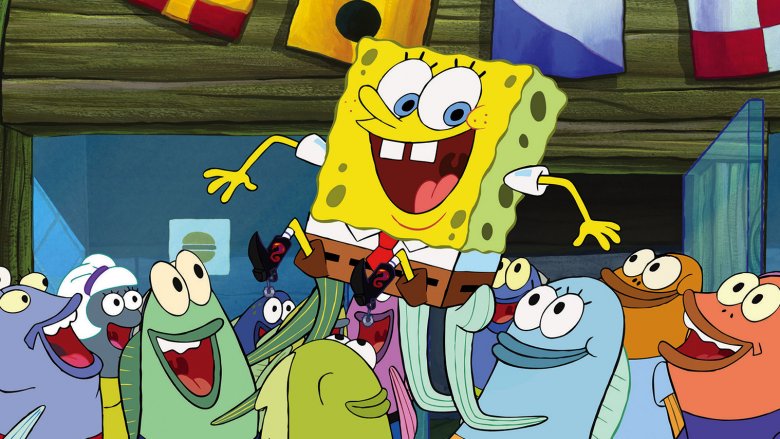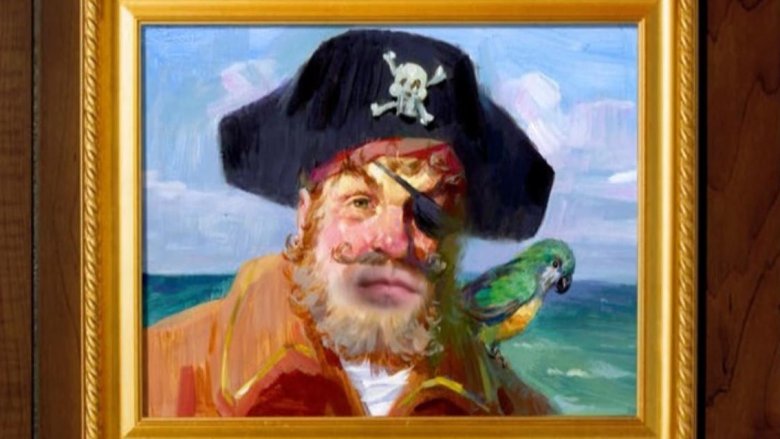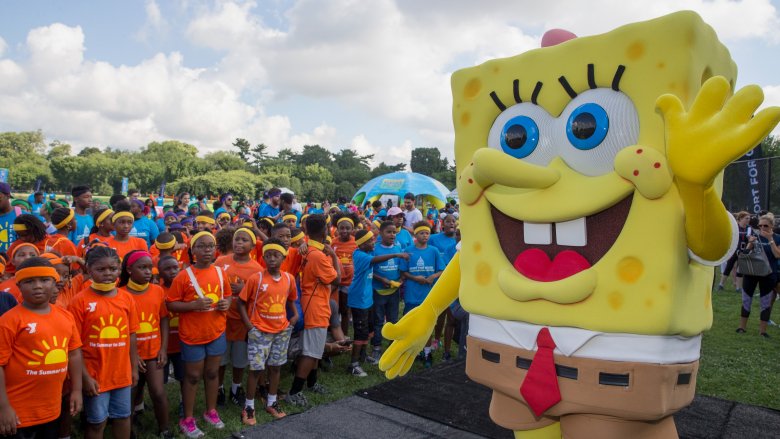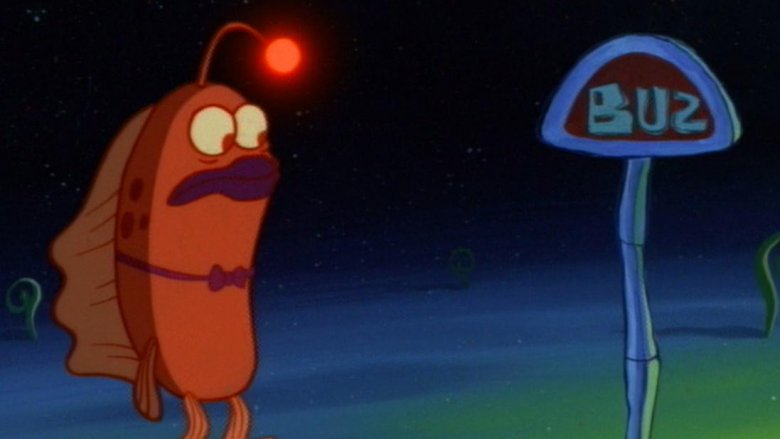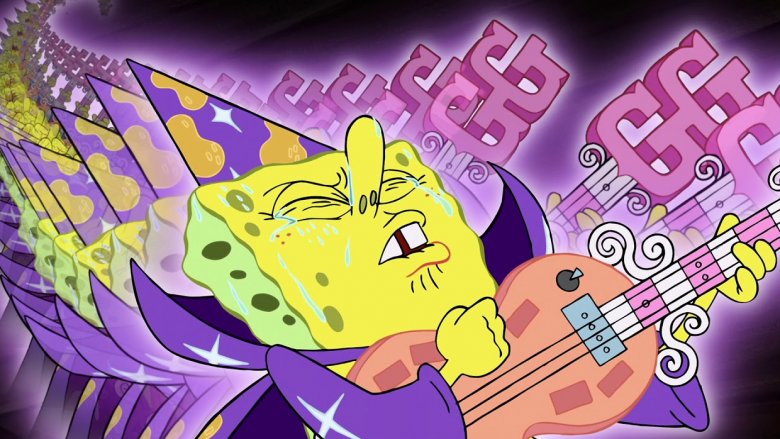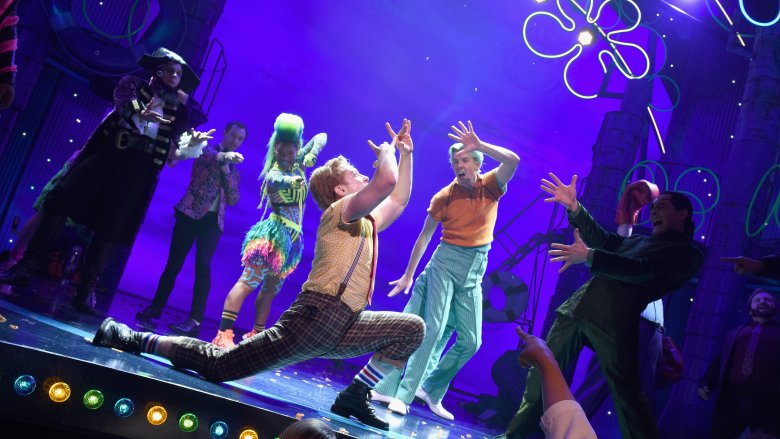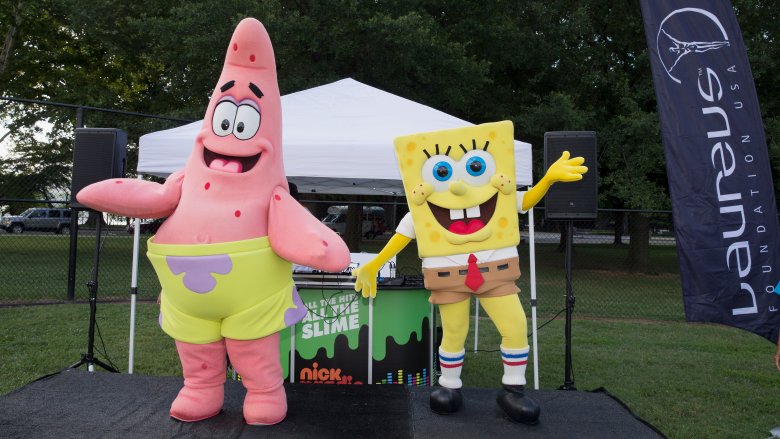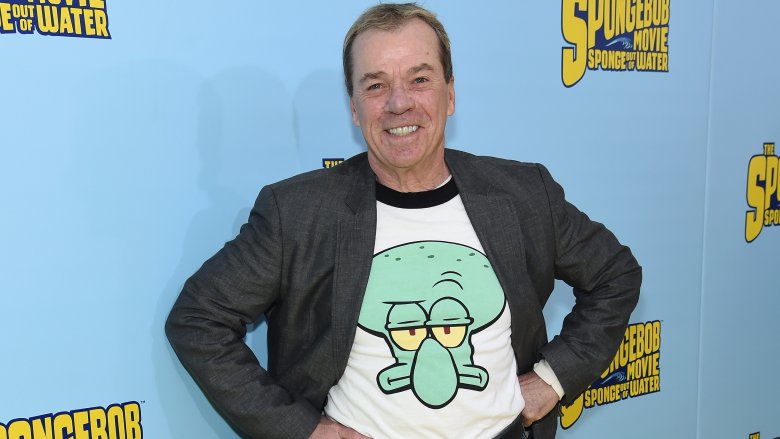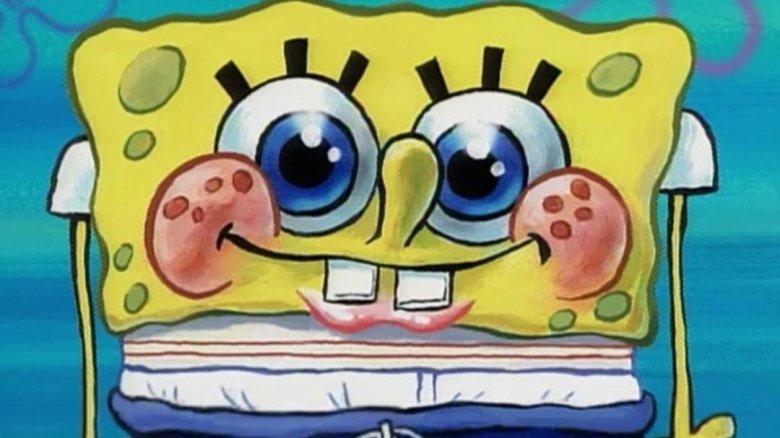Things Kids Love About Spongebob That Adults Don't Get
Spongebob Squarepants has been a bonafide cultural phenomenon for nearly two decades, having been an instant smash upon its Nickelodeon debut in 1999 and showing no sign of drying up any time soon. Those who were once the target audience of its high-energy hijinks have now matured into adulthood, while new fans are introduced to its nautical nonsense every day. It's easy to find lists and explorations of all the things adults catch in Spongebob that the youngest viewers miss — but what about the reverse? Are there things about Spongebob and all his undersea adventures that kids notice but adults don't?
We're here to answer in the affirmative. From the smart and subtle ways it lets kids into its world to its incisive skewering of authority figures, the show has always been filled with trusting nods to its adolescent audience. There aren't just things kids love about Spongebob that adults miss out on — they're some of the most important aspects of the show, period.
It doesn't have to make sense
There are lots of words for the kind of logic Spongebob Squarepants employs: absurdism, dadaism, and surrealism are only a few of them. There have been powerful art movements, collectives, and schools of philosophy dedicated to the pleasures and purpose of acting without obvious rationale. Through some might cringe at corralling Spongebob into the same cultural corner as Marcel Duchamp, the reality is that they act out of the same conviction: the belief that a lack of logic can create great art.
Perhaps that sounds a bit too high-minded for Nickelodeon. Nevertheless, kids respond to the manic energy of Spongebob in a way that is timeless, yet adults often deride. "It doesn't make sense," parents might complain. "How can Squidward play the clarinet underwater? Why is the narrator French? Why does Spongebob appear to be a 20th-century kitchen sponge, despite the fact that his family are natural sea sponges?"
Kids shake their heads at this. They understand what the dadaists did: obvious meaning is not the aim. Spongebob has become a generational phenomenon because the comedy of Spongebob looking like an animate cheese matters more than how he got to be that way. It doesn't have to make sense according to adult standards — it only has to conform to what makes you laugh. That is meaning enough.
Kids get more of the jokes than you'd think
Simultaneously, however, Spongebob makes more sense to kids than adults might think. And not only do the jokes land, but the kids feel incredible for having cottoned on to them. Hearing Squilliam Fancyson III sneer that he hopes the audience for Squidward's band's debut "brings lots of ibuprofen" induces a chuckle and a flush of triumph. Hey, the kid thinks, I think I've seen that word on the bottle in the medicine cabinet. To assume those jokes are there purely for the parents is to underestimate children, and how much they enjoy, as anyone does, feeling in on the joke.
Sometimes it's not even a matter of referencing anything beyond the depth of adult emotion. Kids get that Squidward, full of ennui and job dissatisfaction, isn't too different from some of the adults they know — they've seen an uncle, neighbor, or parent slouch home and sigh. This is dire, but they get it: sometimes life doesn't turn out the way you think. In portraying this experience, Spongebob acknowledges both that kids notice even the darkest things around them, and that they're mature enough to laugh at them.
They appreciate it as art
In the age of memes and screencaps, Spongebob is celebrated for its visual extremes. From the opening shot of Painty the Pirate to Squidward's Bold and Brash, it's full of intricately rendered freeze frames, to the point that entire Tumblrs are dedicated to them. How often do we scroll through our various social media feeds, only to encounter Spongebob's cracklingly-dry face, telling us he "doesn't need" whatever the meme is poking fun at? That appreciation starts in youth, when we first encounter Spongebob's many moments of intense, painterly detail.
It's a tradition with one heck of a lineage, ranging from collectibles like Garbage Pail Kids and Wacky Packages to the caricature work found in Mad Magazine. But it all shares the same love of taking gross, goofy, or just plain strange moments to visual extremes, often with borderline-off-putting results. Parents often find these moments a bit too much to handle — witness the fact that Spongebob and the aforementioned comparisons have all been subject to more than a few attempts at censorship over the years.
But kids appreciate these moments, not just for the laugh factor, but as art. As the first generation of kids to grow up with Spongebob, they pay tribute to these moments for their artistic value, numbering them off one by one and turning them into the memetic currency of the online world. It's a deep impact, even if it starts with just a moment of "whoa, that looked crazy!"
Its role models are actual characters
What we learn about goodness and responsibility in childhood lays the foundation for our conduct as an adult. Accordingly, children's entertainment is concerned with creating strong role models — but what they end up parading before their impressionable audience is often boring. This ends up being a failure of entertainment and instruction, as kids can smell nonsense a mile off and don't tend to internalize the television equivalent of mommy's favorite fiber cereal.
Enter characters like Spongebob and Sandy. Are they goofy? Absolutely. Do they make entirely rational and well-informed decisions? Not often. Are they cool, in the sense of superheroes or secret agents? Definitely not. But they care about their friends and making the world a better place — even if they put that into action by singing songs about Texas and hunting the dreaded Alaskan Bull Worm. Sure, parents might cringe as these cartoon characters shout frantically about "kah-rah-tay," but they're modeling how to be a fundamentally empathetic person in a way kids can enjoy, respect, and learn from. A spoonful of sugar helps the medicine go down — or in this case, a heaping helping of absurdism.
It helps kids understand fear
For as funny as Spongebob can be, it's not afraid to delve into darkness. Nothing is creepier than the first season masterpiece "Rock Bottom," in which Spongebob visits the titular town and finds that everything is somehow... off. There is no gore, nor monsters, nor anything else obviously terrifying, and yet this episode unnerves. Its color palette is all inky blues and greens, in particular contrast to the opening scene in cheery amusement park Glove World. The denizens are deep-sea monstrosities with enormous eyes and gelatinous bodies. The bus seems to actively antagonize Spongebob as he tries desperately to catch it on its way back to Bikini Bottom.
This is all, of course, very funny — these terrifying fish are all speaking between blown raspberries — but it's also deeply unsettling. Kids enjoy the terror, as anyone who's enjoyed a horror movie can understand, but it also mirrors their first experiences with alienation and strangeness. In reflecting these brushes with fright, the show not only assures them that they're not wrong to feel scared but goes on to tell them they can deal with it in the moment and come out the other side laughing. Just as Spongebob makes it back home, so too can they take on what spooks them, no matter how many anglerfish stand in their way.
It's honest about adults not having all the answers
So, we've established that Spongebob succeeds through telling kids they're strong enough to take on the world. But it's not all empowerment and sunshine — a lot of Spongebob is about stuff falling apart. Sometimes the customer just isn't satisfied. Sometimes you don't impress the art critic. Sometimes the jellyfish simply refuses to get into your net. And that's okay.
In reflecting disappointment and disorientation, Spongebob lets kids in on something utterly crucial: the world isn't always fair, and it doesn't always make sense, and nothing will ever change that. It's frustrating. It's unjust. And they need to know, because grasping the fact that things won't always go your way is as much a part of living as triumph. When this fact is foregone, kids can tell something's up — they'll call it cheesy, babyish, or otherwise lame. What they mean is that something is missing, even if they can't name it, and they're being lied to.
Spongebob doesn't lie — rather, Spongebob shrugs and says yeah, Squidward's house is sandwiched between two idiots and he doesn't ever seem to move. Maybe he can't afford to. Maybe every other house in Bikini Bottom has something wrong with it. Whatever the reason, he's stuck there. And that's the way life is, sometimes... but you can live through it.
It shows that's okay to be earnest
Is there anything more quintessentially Spongebob than him charging ahead, chanting, "I'm ready! I'm ready!" with infectious zeal? Whatever he's heading to, work or recreation, he's grinning toothily for all to see. Especially as kids transition from early childhood to adolescence, this sort of naked joy becomes more and more stigmatized. It's not cool, detached, or ironic — it simply is. Spongebob cares about everything he does, and when he's happy, he shows it. It's only antagonistic characters who care about looking silly, or condemn others for acting earnestly. In the end, they always get their due — and those who weren't afraid to show their excitement in the first place win the day.
Kids respond to this, as even the youngest have encountered a teenage sibling or bully who models Squidward-like behavior. They might be above whatever it is they're deeming childish, but Spongebob isn't, and he tells kids that they don't have to be either. He's living life, eyes wide, celebrating his victories large and small. Is it geeky? Probably. Is it lame? Might be. Is he often losing his spongy little mind over something totally mundane? Oh, yeah. But he's excited, and he wants you to be excited as well. And given that Spongebob's got the show named after him, kids get that this isn't just okay — it's a whole lot cooler than actively trying for cool.
It finds joy in the everyday
Spongebob makes flipping burgers look awesome. Not just bearable, not just kind of okay, but all-out awesome. He elevates it into an artform, a ballet, a non-stop thrill ride. And it's not just being a fry cook that knocks his tube socks off — it's everything. Sitting in a cardboard box? Suddenly it's a wondrous landscape of imagination. Getting one's pet to take a bath? An opportunity for glory. Even procrastination becomes a grand guignol of desperation and sacrifice. There is nothing so mundane, so quotidian, so positively dull that Spongebob cannot make it into something mind-blowing.
This is a good lesson for everyone to internalize — learning to look at the every day in a more positive light is classic therapy — but kids haven't learned to be cynical yet. Think of the kids that get into trucks, trains, or construction equipment. For a few years, it is an obsession. Getting a wave from the garbage man or the dude with a jackhammer makes their entire day. And the thing is, they're not wrong for being that pumped. Being able to feed people and make them happy with a perfectly cooked burger is a genuine joy, given the right working environment. Spongebob isn't foolish — he's living his best life. Kids, less bruised by the world, are more in touch with that in a way we could all stand to learn from.
Squidward is every kid-hating adult
Squidward is nearly as much a part of the show as Spongebob himself. As the shadow to the relentless sunshine, he is necessary — and though the show takes care to throw him a few wins, his many, many losses are crucial to his part in the cartoon. That Squidward, with his canned bread, interpretative dance, and ludicrously bad clarinet-playing is meant to be made fun of is obvious. But what kids catch that adults miss is that Squidward is adulthood.
There are other characters with jobs, homes, and all the other signifiers of maturity, to be sure, but only Squidward embodies the parts of adulthood that most weigh upon children. Once we leave childhood behind, we tend to forget just how opposed the world once felt to us, how intensely it seemed to scorn our freedom. Squidward resents anyone in touch with naive joy, lives to mock those who want to have fun for fun's sake. He is, in short, an adult who thinks simply being older makes him better than those who are younger. To see him brought down a peg or two isn't just funny to kids. It's deeply, cathartically satisfying.
It shows that growing up doesn't mean leaving joy behind
Everyone grows up, as a lot of the original Spongebob audience can tell you. This is, mostly, a good thing: you don't need to be learning the alphabet forever, and having your own money is actually pretty great. You let go of the cartoons you love and move onto more mature things. But many years have passed since Spongebob premiered, and the kids that first watched it breathe new life into it every day through clips, gifs, and memes. Not every cartoon got this treatment... why Spongebob?
It's because Spongebob shows you, with his love of Mermaid Man and Barnacle Boy, his joy in jellyfishing, and his deep desire to make people smile, that growing up doesn't have to mean leaving behind the things that make you laugh. It doesn't mean you stop being goofy, or silly, or finding satisfaction in the smallest details. Kids intuit this before the adult audience does, then carry it with them into adulthood... if they're lucky. Then one day, they wake up for work, look in the mirror and realize "I'm ready! I'm ready!" has become their motto, too.
